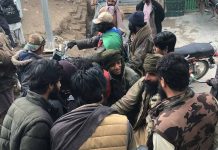A seminar was held in Awaran on Wednesday as part of a sit-in protest calling for the recovery of missing Diljaan Baloch. The event, organized by his family, marked the tenth day of demonstrations outside the Deputy Commissioner’s Office.
The seminar drew significant participation from local residents and activists, including women, who condemned the ongoing issue of enforced disappearances in Balochistan. Speakers accused authorities of failing to address the issue and using intimidation tactics to suppress protests.
Prominent activist and Baloch Yakjehti Committee (BYC) leader Sammi Deen Baloch described enforced disappearances as a systematic effort to instill fear in the Baloch population. “Nearly every family in Balochistan has suffered from enforced disappearances. This oppression aims to silence us, but it only strengthens our resistance,” she said.
She added that despite decades of sacrifices, the Baloch people remain steadfast. “We have endured unimaginable pain, yet we refuse to stay silent,” she said.
Sultana Baloch, a leader of the Baloch Women Forum (BWF), highlighted the critical role of women in the struggle. “Baloch women have always stood alongside men in the fight for their land and rights. Despite the challenges, our resolve remains unshaken, and we will continue until every missing person is accounted for,” she said.
Aasiya Baloch, a family member of the missing man, accused local authorities of attempting to suppress the protest by cutting off food and water supplies and issuing threats to demonstrators. “We are treated as criminals for seeking justice for our loved ones,” she said. “But this protest is our voice, and we will not back down.”
Social activist Gulzar Dost commended the local community for their participation despite alleged efforts to disrupt the protest. “The administration’s actions to block transport and create obstacles show their fear of this movement. The people’s commitment to justice demonstrates their unity,” he said.
Protesters demanded the immediate recovery of Diljaan Baloch and other missing persons, warning that the movement would expand if their demands were not met. They also called for accountability for those responsible for enforced disappearances in the region.
Local authorities have not commented on the allegations or responded to the demands raised at the seminar.
It is important to note that rights groups have consistently raised concerns over enforced disappearances in Balochistan, calling for greater accountability and stronger protections for human rights. However, the practice shows no signs of abating, with reports suggesting it continues to escalate across the region.





























